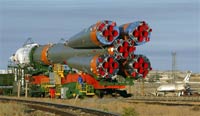First astronaut from South Korea flies in Russian Soyuz
The 30-year-old expert on artificial intelligence will be the first person from South Korea in space. He flies on a Russian Soyuz capsule to the International Space Station next year.

The Ministry of Science and Technology selected Ko San, who has done research on artificial intelligence, said Vice Science Minister Chung Yoon.
Ko beat out Yi Soo-yeon, a 29-year-old female mechanical engineer, following performance and other tests during training in Russia.
"Ko proved to be more comfortable communicating with the Russian cosmonauts and he scored higher on performance and scientific experiment tests," Chung said.
Ko, who has a master's degree in artificial intelligence from the elite Seoul National University, will work on the International Space Station for about 10 days with two Russian cosmonauts next April, conducting scientific experiments.
"I am so happy this very moment and thank you," Ko said in a statement issued by the ministry.
Both Ko and Yi have been employed by the Korea Aerospace Research Institute since being selected for astronaut training.
Ko previously worked on computer vision and artificial intelligence at the Samsung Advanced Institute of Technology, but plans to carry out research into robotics after the space mission.
The ministry's Chung said that Ko must continue to meet training expectations or risk being replaced. Yi will remain in a space mission backup role.
Ko's mission next year will make South Korea the world's 35th country and Asia's sixth to send an astronaut into space, the ministry said.
South Korea is scheduled to complete the country's first space center in Goheung by the end of next year, a move aimed at laying technological and scientific groundwork for space exploration in coming decades.
Since 1992, South Korea has had 11 satellites launched, mostly for space and ocean observation and communications, according to the ministry.
"South Korea's space research is 40 to 50 years behind that of other developed nations," Chung said.
"We currently lack the technology to develop our own capsule to send into space, therefore we believe first investing in human talent is more efficient in speeding up our space research project," he added.
Subscribe to Pravda.Ru Telegram channel, Facebook, RSS!


